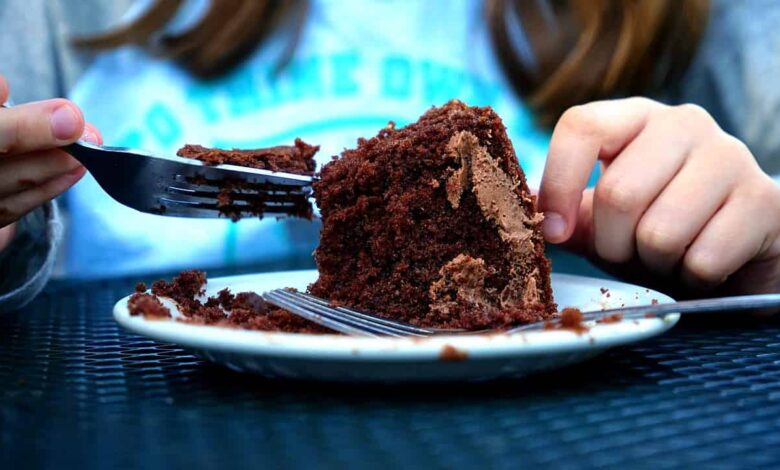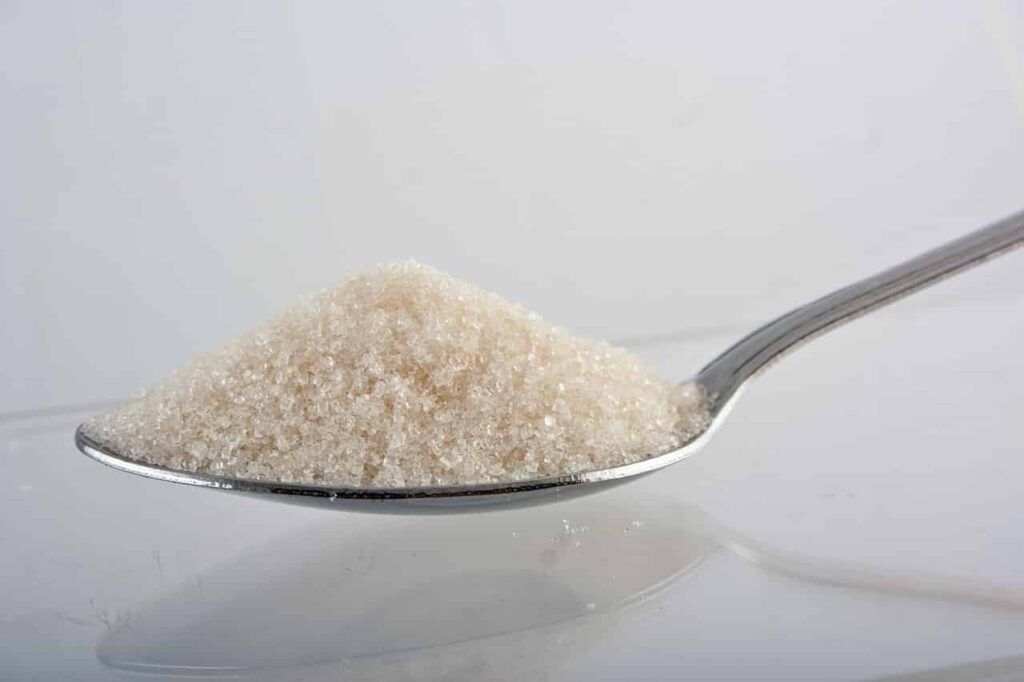Eating Too Much Sugar During Pregnancy: Is It Safe?

Sugar During pregnancy, it is essential to be mindful of sugar intake for both the mother and the developing baby. While a sweet treat now and then is okay, excessive consumption of sugary foods and beverages can lead to potential health risks. High sugar intake during pregnancy may contribute to excessive gestational diabetes and an increased risk of complications during childbirth.
What is Sugar?

Sugar is a carbohydrate that adds sweetness to many foods and beverages. It is a simple molecule made up of carbon, hydrogen, and oxygen atoms and comes in various forms like (table sugar), (found in fruits), and (the body’s primary source of energy). When we eat foods containing sugar, our bodies break it down during digestion, releasing energy for various bodily functions. It’s essential to be mindful of sugar consumption, as excessive intake can lead to health issues like obesity, tooth decay, and an increased risk of chronic diseases. Striking a balance and being aware of hidden sugars in processed foods can help maintain a healthier lifestyle.
Is Sugar Safe During Pregnancy?
Sugar During pregnancy, it is generally safe to consume moderate amounts of sugar, but it’s essential to be mindful of the type and quantity of sugar you consume. Natural sugars found in fruits and some dairy products can be a part of a healthy diet during pregnancy. Excessive intake of added sugars, like those found in sugary snacks, desserts, and sweetened beverages, should be limited. Focusing on a balanced diet rich in nutrients, including fruits, vegetables, whole grains, and lean proteins, is crucial while being cautious about sugary treats.
Which Sugars Are Safe to Consume during Pregnancy?

It’s generally safe to consume natural sugars in whole foods such as fruits, vegetables, and dairy products during pregnancy. These sugars include:
- Fructose: Found naturally in fruits, honey, and some vegetables.
- Lactose: The natural sugar found in milk and dairy products.
- Sucrose: Commonly known as table sugar, it combines glucose and fructose in various foods, especially sweets and desserts.
These natural sugars provide essential nutrients, fibre, and other beneficial compounds that support the mother’s and baby’s health during pregnancy. Limiting added sugars and refined sugars is important as they provide empty calories and little nutritional value.
Eating Too Much Sugar in the First, Second & Third Trimester
- First Trimester: During the first trimester, excessive sugar consumption can lead to issues like gestational diabetes. High blood sugar levels may affect the baby’s early development and increase the risk of complications later in pregnancy.
- Second Trimester: In the second trimester, consuming too much sugar can exacerbate the risk of gestational diabetes and may lead to fetal overgrowth. It can also contribute to increased stress on the mother’s body.
- Third Trimester: By the third trimester, the baby is rapidly growing, and excessive sugar intake may contribute to even more significant fetal overgrowth. This can increase the likelihood of complications during delivery, such as difficulties during childbirth and an increased likelihood of needing a cesarean section.
How To Stop Eating Sugar During Pregnancy?

Stopping or reducing sugar intake during pregnancy benefits both the mother’s and the baby’s health. Here are some practical tips to help curb sugar cravings:
1. Be Informed
Understand the types of sugars in different foods and beverages. Read food labels and be aware of hidden sugars in processed products.
2. Opt for Whole Foods
Focus on a balanced diet with whole foods such as fruits, vegetables, whole grains, lean proteins, and dairy products without added sugars.
3. Snack Smartly
Choose healthier snacks like nuts, seeds, yogurt, or fresh fruit instead of sugary treats.
4. Mindful Eating
Pay attention to your hunger cues and emotions, as stress and boredom can trigger sugar cravings.
5. Gradual Reduction
If cutting out sugar completely feels overwhelming, reduce your intake gradually to avoid feeling deprived.
6. Healthy Substitutes
Use natural sweeteners like honey or maple syrup in moderation instead of refined sugars
7. Plan Meals
Prepare nutritious meals and snacks in advance to avoid eating unhealthy sugary options when hungry.
8. Stay Active
Regular physical activity can help reduce cravings and support a healthier lifestyle during pregnancy.
Note: Remember that making small, positive changes can significantly impact your health and your baby’s well-being.
Sugar in Pregnancy Effects on Baby
Sugar During pregnancy, the effects of sugar on the baby can be significant, making it essential for expectant mothers to be cautious about their sugar intake. High sugar consumption during pregnancy has been associated with various potential risks for the baby. Excessive sugar intake can lead to the baby growing larger than average, increasing the likelihood of complications during delivery and the need for a cesarean section.
Moreover, it may increase the baby’s risk of developing metabolic issues later in life, such as obesity and type 2 diabetes. Pregnant women must focus on a balanced diet that includes nutrient-dense foods while limiting sugary snacks and beverages to safeguard the baby’s health. By maintaining a healthy diet, expectant mothers can promote the well-being of their babies and ensure a smoother and healthier pregnancy journey.
I Ate a Lot of Sugar during Pregnancy
If you consume a lot of sugar during pregnancy, it’s essential not to be too hard on yourself. Many pregnant women experience cravings for sweets or find comfort in indulging in their favourite treats. Occasional consumption of sugary foods is generally not a cause for significant concern, especially if you maintained an overall balanced and nutritious diet throughout your pregnancy.
How Too Much Sugar Is Harmful in Pregnancy?
The amount of sugar harmful during pregnancy varies for each individual and depends on various factors, including overall health, activity level, and preexisting conditions. However, consuming excessive added sugars, which are sugars added to processed foods and beverages, can be detrimental to both the expectant mother and the developing baby. You should limit added sugars to no more than 25 grams (6 teaspoons) per day for pregnant women.
Nutrition of Sugar
The nutritional profile of granulated white sugar (sucrose) per 100 grams:
| Nutrient | Amount per 100g |
|---|---|
| Calories | 387 kcal |
| Total Carbohydrates | 99.98 g |
| Sugars | 99.98 g |
| Fiber | 0 g |
| Fat | 0 g |
| Protein | 0 g |
| Calcium | 0 mg |
| Iron | 0.02 mg |
| Magnesium | 0 mg |
| Potassium | 2 mg |
| Sodium | 1 mg |
| Vitamin C | 0 mg |
| Vitamin B6 | 0 mg |
Side Effects and Precautions of Eating too Much Sugar while Pregnant
1. Side Effects
- Gestational Diabetes: Excessive sugar intake can lead to high blood sugar levels, increasing the risk of gestational diabetes. This condition affects some pregnant women and can have health implications for both the mother and the baby.
- Increased Preeclampsia: High sugar intake has been associated with an increased risk of developing preeclampsia, a serious condition characterized by high blood pressure and potential organ damage.
- Fetal Overgrowth: Too much sugar consumption may lead to the baby growing larger than average, increasing the risk of complications during delivery and needing a cesarean section.
- Developmental Issues for the Baby: High sugar intake during pregnancy has been linked to potential developmental issues, such as an increased risk of obesity and metabolic problems later in life.
2. Precautions
- Moderation is Key: Practice moderation when consuming sugary foods and beverages to avoid excessive sugar intake.
- Read Labels: Be mindful of hidden sugars in processed foods by reading food labels and choosing products with lower sugar content.
- Focus on Whole Foods: Opt for nutrient-dense whole foods like fruits, vegetables, whole grains, and lean proteins, which provide essential nutrients without excessive added sugars.
- Stay Hydrated with Water: Choose water as the primary beverage to stay hydrated and avoid sugary drinks.
- Dietary Choices and Concerns: Discuss your dietary choices and concerns about sugar intake with your healthcare provider to get a healthy life for both you and your baby.
FAQ’s
Is it safe to consume sugar during pregnancy?
Yes, it is generally safe to consume sugar in moderation during pregnancy.
How much sugar is safe during pregnancy?
The American Heart Association recommends limiting added sugars to no more than 6 teaspoons (25 grams) per day for women, including pregnant women.
Can too much sugar during pregnancy harm the baby?
Excessive sugar intake during pregnancy may lead to complications like gestational diabetes and an increased risk of fetal overgrowth.
What are the risks of gestational diabetes caused by sugar consumption?
Gestational diabetes can lead to high blood sugar levels, which may affect the baby’s development and increase the risk of complications during childbirth.
Should I avoid all sugars during pregnancy?
Natural sugars in fruits and dairy products can be part of a healthy diet. However, limiting added sugars in processed foods and sugary snacks is essential.
Can sugar cravings be managed during pregnancy?
Sugar cravings can be managed by focusing on a balanced diet, staying hydrated, and choosing healthier snack alternatives.
How can I maintain a healthy diet during pregnancy without excessive sugar intake?
To maintain a healthy diet during pregnancy, focus on whole foods like fruits, vegetables, whole grains, and lean proteins, and consult with a healthcare provider for personalized guidance.
Conclusion: Step into the world of Lady Well Care – Your ultimate destination for captivating fitness, culinary, and nutrition content exclusively designed for women. Whether you’re on a pregnancy path or embracing life post-abortion, our mission is to guide you towards a healthier, happier life.
- Discover our curated articles on the Homepage and empower yourself to a more joyful existence. Join us today!
